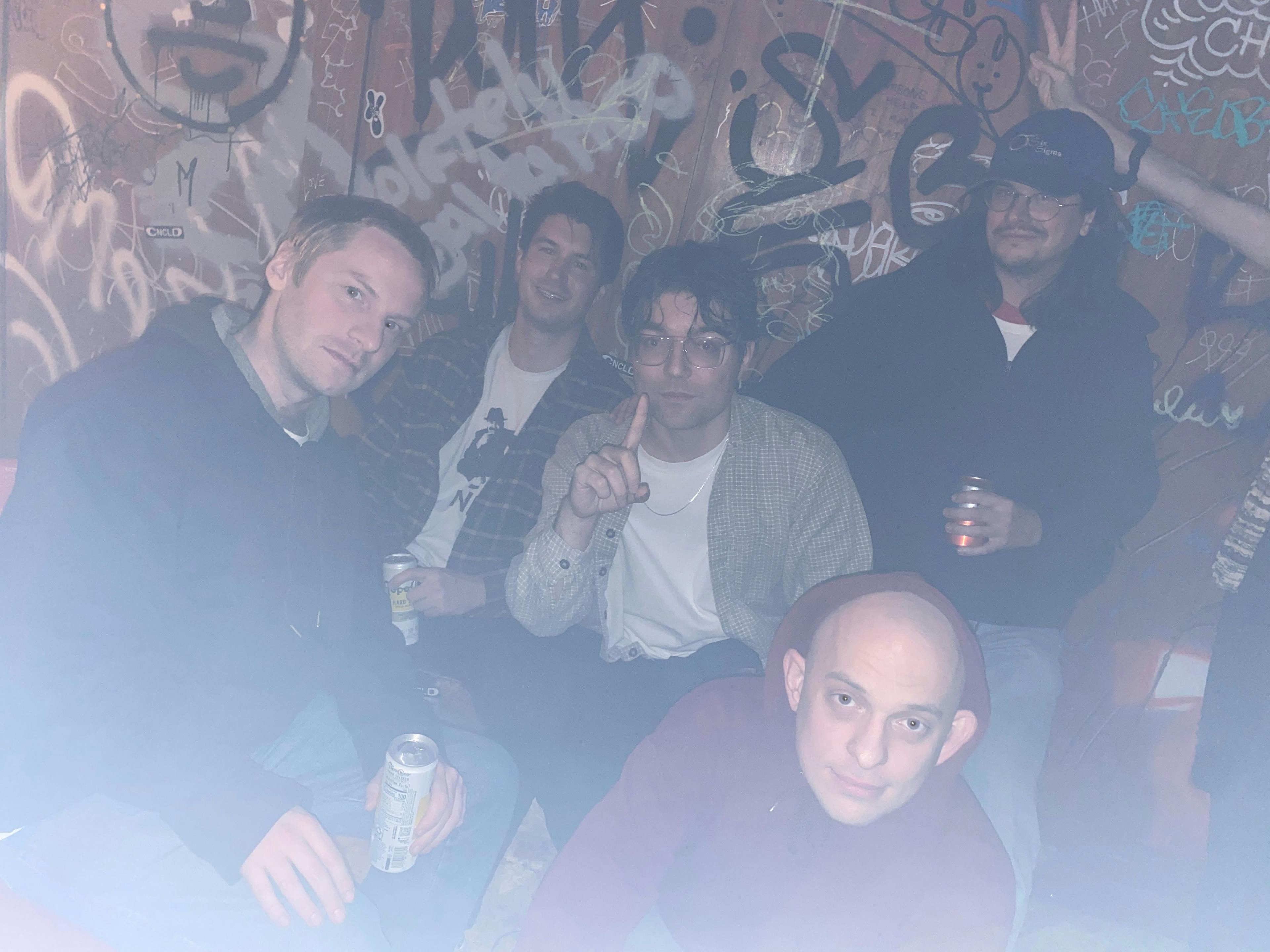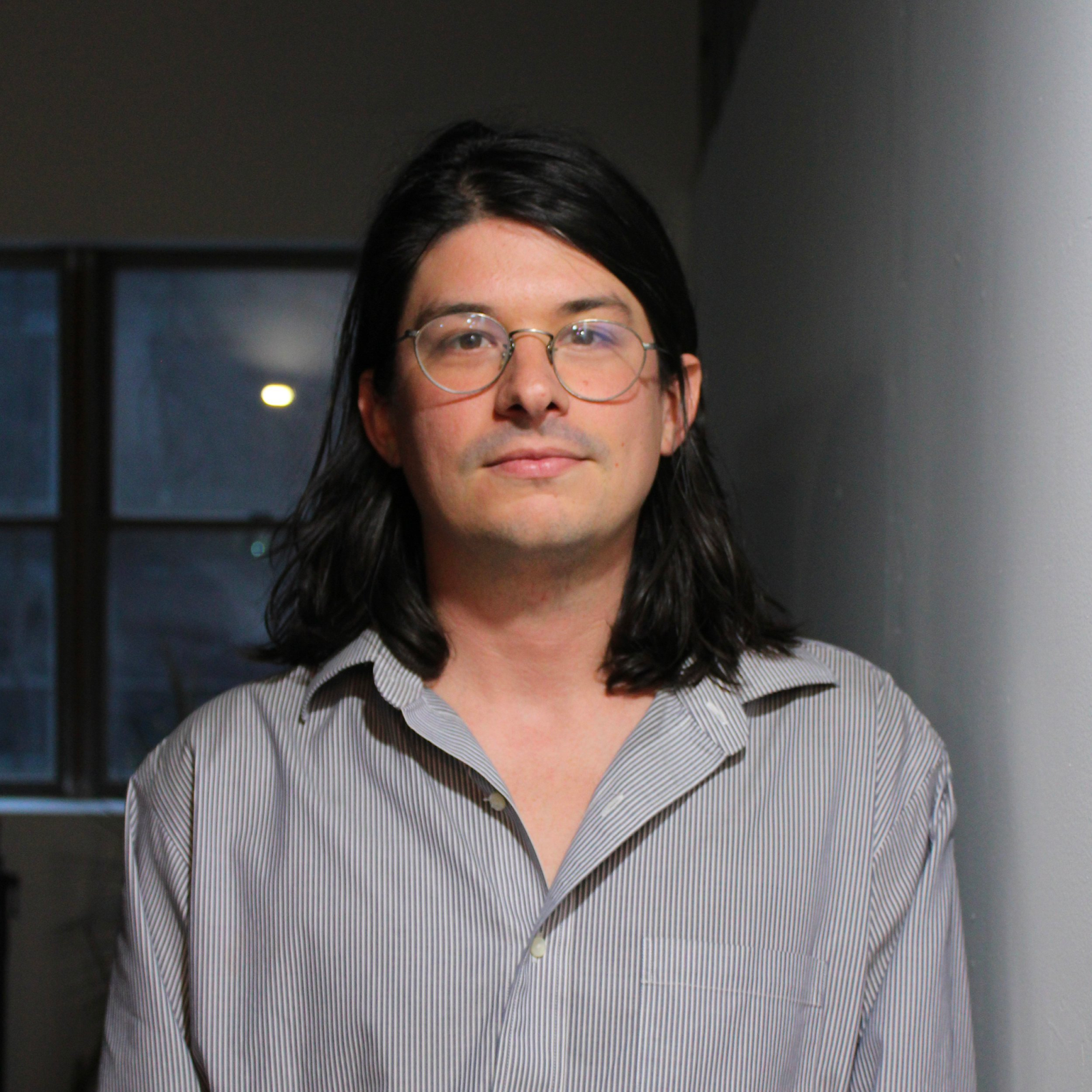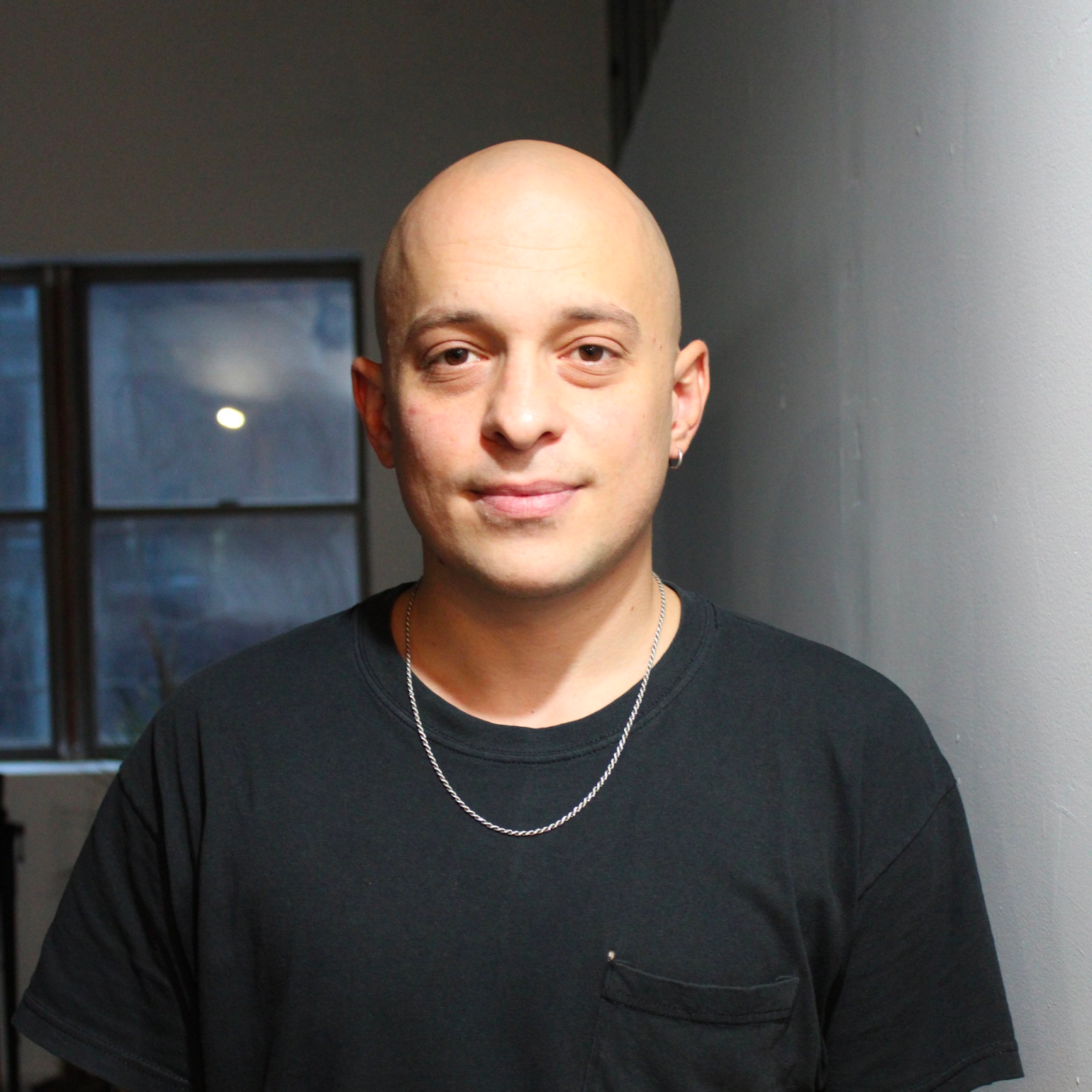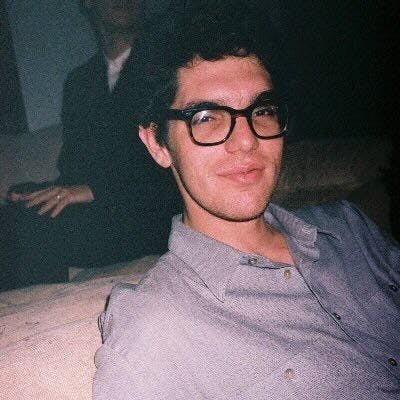A Deeper Kind of Bait: Nina and the Creation of a New Music Platform
Mike Pollard, Eric Farber, Ezra Marcus
Nina Team at the Nina 1 Year Anniversary Party November 18, 2022 (L–R, Jack Callahan, John Pollard, Ian Kim Judd, Eric Farber, Mike Pollard), photo: Maggie Lee

In the early days of the Internet, before Soundcloud and Bandcamp, kids would swap burned CDs and design covers to slip in their jewel cases: handmade objects curated and shared with care. Music was harder to access then—you couldn't just drop a link to a track. Before the corporatized platforms of the internet today, DIY scenes built their own channels around blogs, email lists, message boards, and self-hosted sites — producing a rich network of collaboration that you would only find if you were looking for it. As the musicians and coders Eric Farber and Mike Pollard, who co-created the new music streaming platform Nina Protocol, put it: “The network of music was as important as the act of making it.”
The rise of social media and music-sharing platforms has provided new interfaces for making and sharing music, offering new entryways into scenes and creating a constellation of possibilities for building brands and audiences. In some ways, the intimacy and interdependence from earlier years have faded from prominence—yet, the founders of Nina believe that a digital space that channels these networks of music is possible.
For Discovery, Farber and Pollard spoke with journalist Ezra Marcus about these networks of creators and consumers, “authenticity,” and more, reflecting on Nina's roots and the past and future of the Internet.
Eric Farber:
So I feel like there's been a point, maybe ten-plus years, where a social media vibe is part of the art, part of the performance.
Mike Pollard:
If you're an artist of any kind, you have to make people care about what you do, and it's interesting to observe that playing out in real time.
Anything that has reached visibility or awareness is because some people cared and made more people care. The role of a curator historically has been to identify what is important to them and then translate that “why” to the world.
There's a whole spectrum of posting frequency that people choose or the amount of themselves that they're willing to share, and all along it, there are different ways to make people care about what they're doing. Making good music is one way, but it's not the only way.
Ezra Marcus:
What is it about bands like Shed Theory and bar italia that's different about how they're approaching that problem?
EF:
I think if you're doing something, whether that's making music or art or you're getting on stage, you are not detached from the spotlight that also exists through social media.
Shed Theory and bar italia are two acts at opposite ends of the spectrum in terms of how they engage. Shed Theory shares a ton of content, and you can always see what they're doing. They're building lore. And you see the opposite end of that spectrum is an act like bar italia; there are no pictures of them, they're not online. Mysterious on purpose. But still, it's just negative space functioning in the same system.
MP:
I don't think that anyone on either side of that spectrum is being cautious or withholding on purpose. They're just doing what feels natural to them. Yes, you have to engage with this system one way or another, but ultimately you have to be yourself in being this thing that's presented to the world. It's about creating this idea of “The Total Artist.”
EM:
Where does actually putting songs out fit into it?
EF:
I feel like there's a thing now, and with the Shed Theory people, it feels like the music is both the final and not the final product. That's almost like the bait that pulls you into their universe, but it's kind of this cyclical thing, like a chicken or the egg scenario, like you listen to the music, you hear it, you go fuck with them online, you continue to fuck with them online, and then you listen to more of the music which is kind of an ideal situation as an artist.
MP:
That system is also a deeper kind of bait because it can pull new people in, new collaborators, new producers, so it's a way to expand that world.
EM:
How much of it is about parasocial dynamics, where the fans feel like they know all these people in real life?
MP:
With the Internet, the parasocial always seems important, right? The Internet makes everything feel pretty close.
EF:
And I don't even necessarily think that this is a new thing, we just have a lot more of it now. Take Beatlemania and fans buying magazines and keeping up and getting all the facts that they can about an artist; it's been happening for decades. The difference is that we just have a lot more information now, so the audiences feel para-socially closer.
MP:
Good art should do two things: make people want to make art or make people want to stop making art. And then, sometimes, even bad art can provoke you into making something totally different because you think it sucks and you can do better.
EF:
Fitting into that, I would love to think that what we're doing with Nina makes people want to do more. Like when Surgeon told us a couple of years ago that having this new place to put music was inspiring him to make new shit.
EM:
Part of it is that if you just want to release something straight to a Nina type of platform, it's maybe because you don't need the label to interface you with the radio or whatever there is this whole new self-driven ecosystem for promotion.
MP:
The user-generated music model is what really shook up the traditional album release cycle. The fact that you can meet up with someone in a night, record a track, and have it live in seconds after you finish recording it or mastering it or whatever is probably not something that the suits in the record industry have fully come to terms with.
They understand these platforms as a way of identifying talent that they can then try to put through their machine, but I would hope that there are ways for people to make it through without having to enter into that machine. Something like SoundCloud definitely did that to gain awareness and get people's attention, getting something out there that could go viral, but it doesn't completely close the loop.
EF:
The way that some people play their practice or their career on the Internet, some people move really fluidly through Instagram, Twitter, YouTube, and SoundCloud. They understand every website as the medium that it is, and they're good at it.
And what's different about being a fan now is you're not waiting to go to the record store and buy a Rolling Stones record and come home and listen to the same 10 songs over and over for two years. You're constantly engaging as much as you want to.
Without a strong record music industry, maybe the role of a musician is viewed differently. People don't want the Rolling Stones' career anymore; they want something that probably involves everything from producing a movie to acting or who knows what.
It's like the industry is saying you have to do all these things to make it. It might just be that the lack of strength of the industry makes it so that these kinds of multifaceted careers are just what make more sense right now.
MP:
Right, it's like, people who are making music now, on the one hand, have had access to all of music in an un-genre-fied way. So you don't have to be like, “Okay, I'm a goth kid now,” because music is hard to come by and records are hard to come by, so you invest in that, and for whatever reason, it becomes your identity. Now you can be like, “I'm goth today,” or “I'm goth on this song,” but on the next song, “I'm Neil Young,” or “I'm Mazzy Star,” or whatever.
We haven't had a chance to even see what that means yet because we have a lot of people like us, 35-year-old people, who still remember all the different silos in high school, all the identities you could be, though you couldn't be three of them publicly. Or maybe you secretly had some friends who went across those boundaries, but it wasn't like just a big fuck fest of music or something.
What we're starting to get at is there's this big beautiful fuck fest of all of cultural history working at once, and the kind of things that resonate that come back are pretty interesting and funny.
EM:
I think one thing you get a lot from people our age or especially the older boomer mindset is “the kids will never understand what it was like to belong to a subculture,” like they used to mean something. And yeah, I'm sure being fucking goth in the 80s was insane, but the position, the feeling I think, is still there with how a teenager feels about Shed Theory, they still feel that, they're drawing that on their Converse, and buying t-shirts and wearing them in class, and it still means something to them. So the question is, how could it, on the one hand, be totally non-siloed but still have that alt resonance?
I think that there's something high schoolers have access to now, where the nature of having social media profiles allows you to be really fluid. You can be like, “Here's my pop project,” and then you can just spin up another Instagram and you're like, “Here's my rap project.” With the Yung Lean and jonatan leandoer96 stuff, I don't know if this was as accessible for people before, and that's why you had to plant your stake in the ground, being like, “I'm a punk, “I'm a goth, “I'm a jock,” and so on.
MP:
All these things that we are talking about are good developments, and it's because of the Internet. Regardless of the bad parts of the Internet, you have to imagine that there is a way to take this thing that's done a lot of good and make it do more.
EM:
Yeah, like Eric, what you're saying about these side projects, I feel like a big shift in the millennial approach to the Internet is like, “I need as many followers as possible on whatever thing I'm doing, I'm promoting myself by getting famous,” and the new thing is like, “I need to have as few followers as possible, and I need someone to not know if that's me, or be unsure about it but still interested in it, and trying to decipher like “is that jonatan leandoer96,” “is that Yung Lean,” that kind of thing that's almost more powerful now than like “I have one million followers on Instagram that are all fake, because I'm you know some fake Machine Gun Kelly-style guy from LA.”
MP:
Well, at a certain point, don't all followers become fake? There's just a certain threshold where it's like, how many of those people can really like you?
EF:
We're in a post-metrics era now where everyone went too ham, and then it got too productized, and now it's cool to be niche and obscure. It's a return to people actually interacting with or being interested in things rather than just engaging. Or at least that's kind of the optimistic angle on the internet, and that's what we're trying to do with Nina, which is encouraging that shift.
MP:
There was this show that Dolan and I tried to go to, phreshboyswag x xaviersobased. When I got into the line, it was already probably 500 people long, around the block, and these high school girls got in the line behind me, and then a girl who was walking past asked the girls behind me what they were in line for, and the high school girls said “Oh you wouldn't know what it is, it's underground.” and I just thought it was so funny because now we can have this thing where you have a sea of kids in the line but then also say “You wouldn't know, it's underground.” Is there an above-ground underground or something?
EM:
I feel like I read some articles about the idea that the questions that we all grew up with around “Is x, y and z authentic?” were a total trap, and now it's such a red herring that we have what you're saying, this kind of permanent access to all of culture. There has to be a new way forward that doesn't revolve around “This person's a real shoegazer because he's from Seattle,” or whatever. What do you think is the right approach there?
EF:
It's good to not care and I also feel like the conversation that used to exist about bands selling out and stuff doesn't exist anymore, and I think that it was a negative thing when it existed. That was some weird Gen X-inherited thing where people are mad at someone when they sell out and you just start to be socialized to behave that way but you don't really care or know what it means.
EM:
I was reading about all these Gen Z shoegaze songs they're making now. These 18-year-olds: they're not playing in bands, they're just making them in Ableton, but it sounds legit and they're obviously doing a pastiche, but that's cool. It sounds good, it sounds like they're carrying something forward even if they're not breaking any new ground per se, but that doesn't really need to be the issue anymore.
EF:
There are probably steps forward being made, and I know people use monoculture as a buzzword, but I feel like it's actually that people have so much access to the historical archive that there are way less boundaries than there ever have been before, where it's cool if you're making Shoegaze in 2024, and maybe 15 years from now that era will have a name and it will be authentic.
MP:
Music rocks and music has this really cool built-in feature where if you don't like it, there's a whole suite of buttons you can press to make different music come on.


